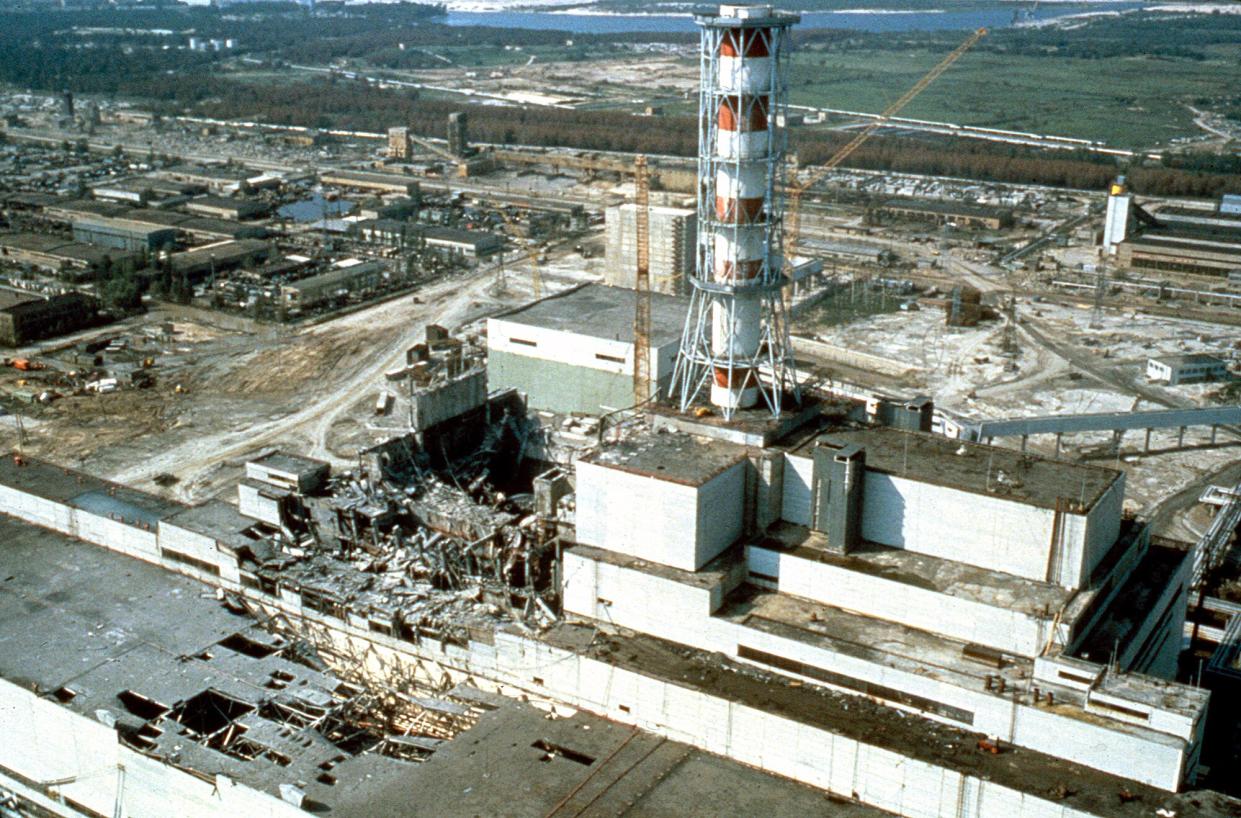Ukraine's State Power Company Says Russian Soldiers Are Leaving Chernobyl After Being Exposed to Radiation

Igor Kostin/Laski Diffusion/Getty Images Chernobyl
Ukraine's state power company said Thursday that Russian soldiers have left the site of the Chernobyl nuclear power plant and are headed toward Belarus, claiming that some of the soldiers had "received significant doses of radiation."
The Associated Press reports that the Kremlin has made no comment about the radiation claims.
The power company, called Energoatom, said in a statement posted to Telegram Thursday that groups of Russian soldiers left the Chernobyl nuclear power plant and the satellite city of Slavutych. A handful of occupiers remain, the statement read.
"It was confirmed that the occupiers, who seized the Chernobyl nuclear power plant and other facilities in the Exclusion Zone, marched in two columns towards the Ukrainian border with the Republic of Belarus," the statement read. "This morning, the invaders announced their intentions to leave the Chernobyl nuclear power plant to Ukrainian station personnel."
It's unclear why the soldiers are leaving the plant, which was taken over in February, though Energoatom claims it might have to do with the soldiers having built fortifications and trenches in the Red Forest, the 4-square-mile area surrounding the Nuclear Power Plant and one of the most contaminated sites on earth.
According to the company's statement on Telegram, the Russian soldiers "received significant doses of radiation and panicked at the first sign of illness."
RELATED: The 'Very, Very Dangerous' Risk of Damaging Chernobyl in Russia's Invasion of Ukraine
The 1986 explosion at the Chernobyl nuclear power plant spewed clouds of radioactive material over the surrounding area and emitted 400 times the radioactivity as the bomb dropped on Hiroshima during World War II.
The International Atomic Energy Agency (IAEA) recognizes the immediate death toll as 31 — a number that includes plant workers and firefighters responding to the disaster — though many more people ultimately died as a result of the radiation exposure.
The true cost of the disaster remains unknown, with reports obtained by TIME estimating some 4,000 to 90,000 victims.
A "sarcophagus" surrounding the nuclear reactors provides a shield covering the radiation materials stored at the site.
But as Dr. Lydia Zablotska, a professor of epidemiology and public health at the University of California, San Francisco, told PEOPLE, the radioactive hot spots in Chernobyl's exclusion zone are unevenly distributed — raising the possibility that someone who doesn't know what they're doing, or is unfamiliar with the area, could cause significant damage, even by accident.
"People who don't know what they are doing, if they try to interfere with the sarcophagus or storage facilities, it could expose people to high doses of radiation," she said in an earlier interview.
RELATED: Meet the Female-Only Carpool Keeping Ukrainian Women and Children Safe in Poland
Russia's attack on Ukraine continues after their forces launched a large-scale invasion on Feb. 24 — the first major land conflict in Europe in decades.
Details of the fighting change by the day, but hundreds of civilians have already been reported dead or wounded, including children.
The invasion, ordered by Russian President Vladimir Putin, has drawn condemnation around the world and increasingly severe economic sanctions against Russia.
With NATO forces massing in the region around Ukraine, various countries have also pledged aid or military support to the resistance. Ukrainian President Volodymyr Zelenskyy called for peace talks — so far unsuccessful — while urging his country to fight back.
Putin insists Ukraine has historic ties to Russia and he is acting in the best security interests of his country. Zelenskyy vowed not to bend.
"Nobody is going to break us, we're strong, we're Ukrainians," he told the European Union in a speech in the early days of the fighting, adding, "Life will win over death. And light will win over darkness."
The Russian attack on Ukraine is an evolving story, with information changing quickly. Follow PEOPLE's complete coverage of the war here, including stories from citizens on the ground and ways to help.

